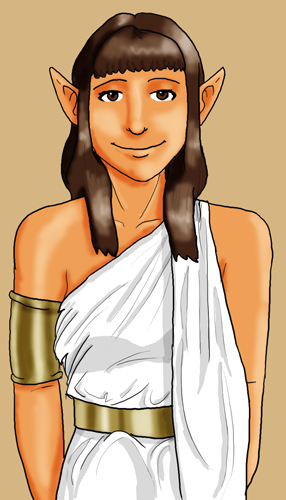





|
Deity
Range: Deities are native to Barashi. They are not geographically limited. Lifespan: Immortal Barashi has 24 gods. Two, the Maker (the personification of order) and the Destroyer (the personification of chaos), are overdeities. The other 22 gods include six greater deities (their first six children) and sixteen lesser. Greater gods:
Lesser gods:
For all practical purposes, the gods are omnipotent in their home plane. Although they are not intrinsically omniscient, they have ways of finding out just about anything they'd like to know. Disputes between gods are settled not by destructive clashes between omnipotent beings, but by petitioning the Maker (the Destroyer is, by and large, not available to receive petitions). The Barashin deities make no secret of their existence, and appear regularly to mortals throughout the world. They do not require worship (though they get it anyway) and there are no scriptures for them, but they object strenuously - and sometimes violently - to the pretense of divinity by a mortal, or the insinuation that there might be gods other than the named 24. Deities can be identified without even looking, by their distinctive "presence": a highly obtrusive sensation of their charisma noticeable from hundreds of feet away. Mortals may petition deities for favors above and beyond everyday prayers, but these extra gifts are never given for free. This is a mechanism for slowing down the requests and discouraging dependence, more than to actually perform a transaction that is more worthwhile for the deity. Nonetheless, it is not too irregular for a mortal to contact a deity via the caretakers of the nearest temple, solicit a service, pay the exacted price, and get their wish. (Deities sometimes test mortals by first asking unacceptable prices - e.g. one's firstborn child - and then refuse to perform the service if the price is accepted, on the grounds that the mortal has proven him or herself unworthy.) Barashin deities can speak any language. All of them have residences, some on the Barashin planet and some elsewhere (e.g. in a sun or the moon, for the pilots). They are all related, and appear on this family tree (without images). Deities have "true forms" with assorted appearances from among the variation in Barashi's sapient population. However, they conceal the nature of these forms, and appear to onlookers as members of each observer's own species and ethnic group.
The following character is a deity:
|


